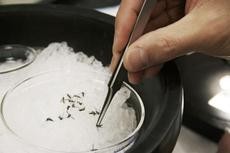Imagine the satisfaction in knowing the bite you received from that pesky mosquito was the last meal they’d ever have. Researchers in UA’s College of Science are working towards making that a possibility.
Mosquitoes that carry diseases like yellow fever and malaria are commonly found in South America and Africa. These types of diseases could significantly decrease if mosquito populations were controlled, said Roger Miesfeld, a professor in biochemistry and molecular and cellular biology.
“”The goal is to find inhibitors that block the ability of the mosquito to digest the blood meal,”” Miesfeld said. “”It could either kill them – that would be ideal – or she would lay less eggs.””
The female mosquito must take blood from a host in order to gain the nutrients necessary for her to lay eggs. The amount of blood that she takes in is equal to her body weight and if she doesn’t digest it fast enough she will die, Miesfeld said.
“”They take in this huge amount of blood and they can’t poop it out, they can’t get rid of it and they can’t digest it,”” he said. “”It would almost be like someone who ate themselves to death.””
Jun Isoe, a research assistant professor of chemistry and biochemistry, is trying to figure out which pathway would be best to inhibit the female mosquito’s digestive process.
“”Because their lifespan is so short, this event is extremely important. This is the only protein source they can get,”” he said. “”There are so many pathways you can study and use as an inhibitor to make the female mosquitoes lay less eggs.””
Miesfeld said the best strategy for eliminating these diseases from the population is not to rid the world of mosquitoes all together, but eliminate the pathogen that carries the disease within them.
“”The best way to eliminate or keep low the number of humans that have these diseases is get the mosquito population down and what happens is the pathogen dies with the mosquito,”” he said.
He also mentioned that these types of diseases occur in parts of the world where healthcare isn’t maintained and mosquito populations are not controlled.
These diseases don’t exist in the United States because the pathogen isn’t present in the environment.
“”So that’s fine, you just coexist with the mosquitoes,”” Miesfeld said. “”They are just pests.””
In order to prevent these mosquitoes from digesting or continuing to lay eggs, one strategy would be to create a pill that has no effect on humans, but deadly effects on mosquitoes.
“”It would be a small drug that inhibits the mosquito’s enzyme, but not your enzyme, and it has no effect on you,”” Miesfeld said. “”One sense would be to get everybody in the village to take the pill and then the mosquito would bite the person and the mosquito would die.””
Miesfeld said he is hoping this kind of treatment could be instituted within the decade.
“”The mosquitoes are definitely laying less eggs and they are definitely sick,”” he said.
Alberto Rascón, a fifth year grad student in chemistry and biochemistry is working on trying to clone specific genes. In doing this, he hopes to characterize the enzymes that digest proteins to find out which pathway is best to block.
He also mentioned how the mosquitoes in their lab are free of disease.
“”If they were to fly out, they could pick up the virus from a host, but these are clean mosquitoes with no infection,”” he said.
If these diseases aren’t controlled there will be a never-ending cycle of disease outbreaks, Miesfeld said.
“”As long as you have mosquitoes that are infected and as long as you have humans that are infected, every rainy season they’ll just go back and forth spreading the disease,”” he said. “”What you want to do is keep the mosquitoes away from the humans so the pathogen dies out and the human’s immune system will clear out the pathogen as well.””









